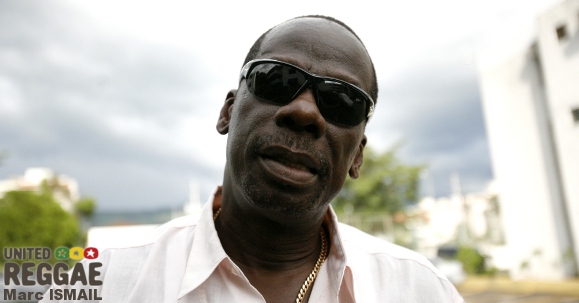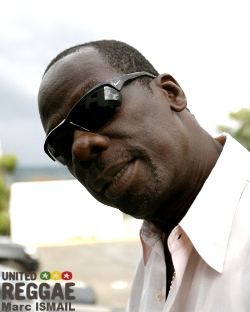Articles about reggae music, reviews, interviews, reports and more...
Interview: Leroy Sibbles
- Home
- Articles
- Interviews
- Interview: Leroy Sibbles

Interview: Leroy Sibbles
"Jackie Mittoo was at Studio One before me and he was my inspiration"
Sampler

Leroy Sibbles reminisces and reveals favorite contemporary artist
Leroy Sibbles is a bonafide legend in the reggae industry with almost 50 years in the business and countless immortal bass lines and riddims with his name on them. United Reggae met him after a performance by The Heptones at Uppsala Reggae Festival.
It’s a few minutes past 1 o’clock in the morning and I’m sitting in the chilly and damp press tent waiting to interview Leroy Sibbles, front man and lead singer in The Heptones.
The clock keeps ticking and suddenly me, two photographers and another reporter are asked to relocate to a warmer setting.
It turns out an early August night in Sweden is too cold for Leroy Sibbles and he is freezing at the moment. Instead of meeting in the press tent outside we are asked to interview him in a container where Uppsala Reggae Festival’s founder and promoter Yared Tekeste usually has his office.
This is the second time The Heptones perform at the festival. The first time was in 2009 on the tent stage. This time they are headlining the first night of the festival.
“The show was good,” states Leroy Sibbles and fires off one of his many big smiles during the interview session. He continues:
“When I leave Jamaica I know I will have a goodtime. I’d do it for free, but I can’t afford it,” he laughs.
It’s obvious that Leroy enjoys Europe, a place much different from his home island of Jamaica.
“People go all the way in Europe,” he explains.
He’s in a great mood. Laughing and joking around with the people listening in on the interview.
One of them is Barry Llewellyn, one third of the original line-up of The Heptones. But it’s apparent that Leroy is the front man and spokesperson. Barry sits quietly close to the door during the entire session.
At an early stage Leroy makes it clear that he has probably already been asked all the questions that me and my reporter colleague would like to ask. He seems tired of getting the same questions on legendary foundation producer Clement “Coxsone” Dodd over and over again.
Studio One important
But it turns out he isn’t as reluctant as imagined.
The Heptones – originally a vocal trio that encompassed Leroy, Barry and Earl Morgan – started their journey in 1965. Their early work was for Coxsone Dodd with smash hits such as Fattie Fattie, Pretty Looks isn’t All and I got the Handle. Later in the 60’s and in the 70’s they went on and started recording for other major Jamaican producers, including Harry J, Lee Perry and Joe Gibbs.
“Studio One is important to me. I was just a kid in the ghetto at the time,” says Leroy and continues explaining how the recording process could look like:
“Coxsone was the one with control and he put it out there. Put it on the market. We had no saying and when we worked he wasn’t there. He would come in at night and review what we had done.”
Jackie Mittoo an inspiration
According to Leroy, as well as several other sources, the late keyboard player and arranger Jackie Mittoo was in charge at the Studio One recording facility.
“Jackie Mittoo was at Studio One before me and he was my inspiration,” says Leroy and adds:
“We were the ones that broke Jackie Mittoo. We did Fattie Fattie and he became really popular with an instrumental [Ram Jam] that busted the place up.”
Key role
 Jackie Mitto was also the one who taught Leroy to play the bass when he arrived at Studio One as a singer. The pair teamed up with Wayne Anton in the late 60’s playing jazz as the Jackie Mittoo Trio doing club engagements.
Jackie Mitto was also the one who taught Leroy to play the bass when he arrived at Studio One as a singer. The pair teamed up with Wayne Anton in the late 60’s playing jazz as the Jackie Mittoo Trio doing club engagements.
Leroy soon picked up the acoustic guitar as well.
But he was not just a musician and a singer. His role at Studio One expanded and he started to help out with auditions on Sundays as well as being an important part of the in-house band at Studio One, variously known as The Soul Brothers, The Soul Vendors, Brentford Road All Stars or Sound Dimension.
“My first recording was a Ken Boothe song and my second was Baby Why with What Kind of World on the flipside [TheCables]. Jackie gave them to me,” remembers Leroy.
He is also responsible for several immortal riddims that have been versioned countless times – The Abyssinians’ rasta anthem Satta Massagana and Full Up (or Pass the Kouchie) are two of the most recognized examples.
Queen Ifrica and Anita Baker two favorites
Even though Leroy and The Heptones haven’t recorded much in recent years, he is up to date with new music coming from Jamaica. And his favorite artist at the moment is a dreadlocked female singjay – Queen Ifrica.
“I call her Queen Africa. She’s no freak. She’s a real rasta”, he laughs.
When it’s revealed to Leroy that Queen Ifrica will perform at the festival two days later, Leroy’s reaction is instant.
“I’m not going anywhere, I’ll cancel the tour,” he smiles.
He continues describing what makes Queen Ifrica such an interesting artist.
“Her culture, the sound, the lyrics and the way she moves. She’s a total rasta,” he explains and remembers:
“Back then it was a stigma around rasta. You could not enter the premises as a rasta. You couldn’t have a job if you were a rasta,” he states, and adds:
“People today are not rasta. It’s just dreadlocks. Few people have that faith.”
But it’s not just reggae for Leroy. His all-time favorite album is in a different vein.
“Anita Baker’s Rapture. There’s nothing bad about that album. I can play every track. Not skip one. The arrangements, the production and the tempo. I play it for my bass man. It’s the best album in the world,” concludes Leroy and leaves the room hugging everybody on his way out.
Read more about this topic
Comments actually desactivated due to too much spams
Browse by categories
Recommended Articles
Latest articles
Recently addedView all
© 2007-2026 United Reggae. All Rights Reserved. Reproduction in whole or in part is prohibited. Read about copyright
Terms of use | About us | Contact us | Authors | Newsletter | A-Z














